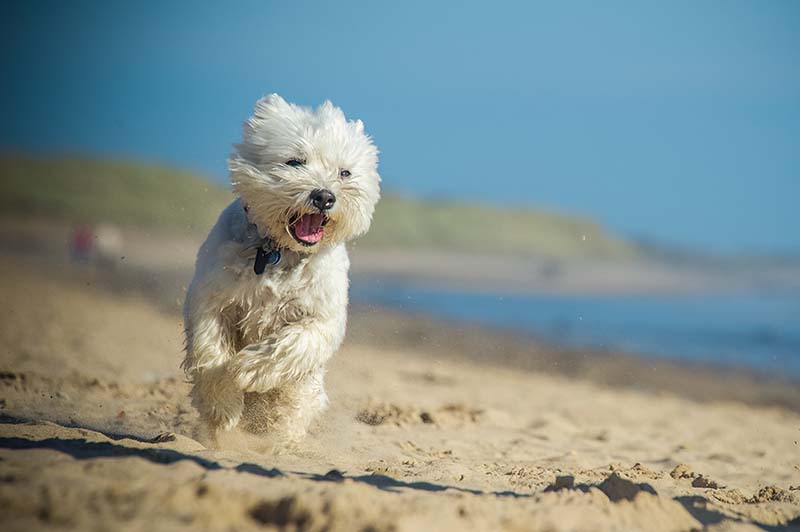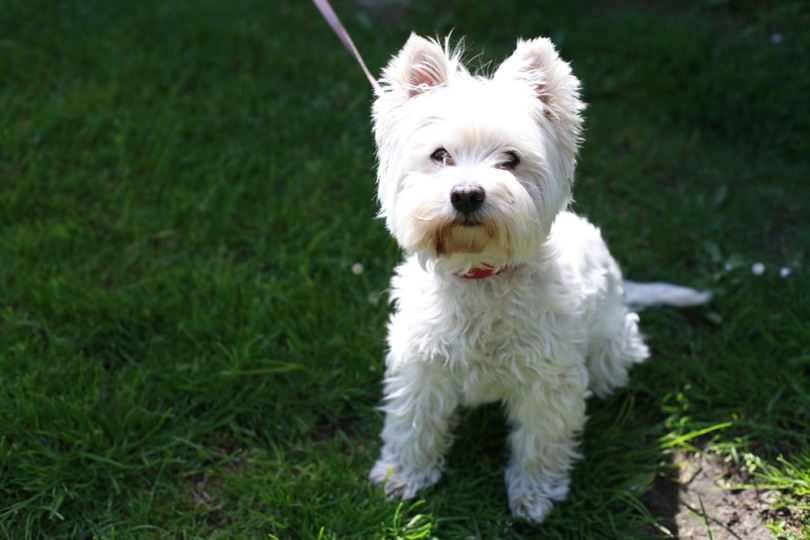Every dog has an individual character, which means that while your Westie might be playful, lively, and energetic, the Westie living next door might be more prone to lying on the couch all day. With that said, breed characteristics are a general sign of a dog’s potential traits. With the right conditions, those traits are likely to come to the fore. Alternatively, if you don’t correct or take action to prevent certain characteristics, they may become prominent.
So, it can be beneficial to look at the likely pros and cons of the West Highland White Terrier to help you bring your dog up in such a way as to create the perfect pet pup for your family. Also, one person’s pro may be another person’s con, so while most people might view excessive barking as a bad trait if you’re looking for a dog to use as a watchdog and to alert you to any potential intruders, it could be viewed as a positive attribute.

The 7 Westie Pros
1. Westies Have a High Intelligence Level
There is no doubt that the Westie is an intelligent breed. It learns quickly and will become accustomed to life in your home as well as your schedule. Most of the time, this is a positive trait in a dog, but it also means that if you don’t provide structure and help your dog learn what you want it to do, it will make up its own rules. If you don’t provide entertainment or exercise, your Westie will use its intelligence to dream up ways to entertain itself.

2. They Are Small But Tough
Generally, small dogs are easier to look after. They don’t take up as much room in the house, and even if they are energetic, their small legs don’t require as much exercise as a giant breed. But they can be more fragile. Despite being a small dog, the Westie is a terrier at heart, which means it is tough and resilient, too.
3. They Love to Play
Another benefit of most terrier breeds, and certainly the West Highland White Terrier, is they love to play. Their size means they will enjoy indoor games, but they are especially fond of playing outside and enjoying a run off the leash. They are good at catching balls and frisbees and you can even enroll them in agility classes and some other canine sports.

4. They Are Loving With Their People
Westies are known for being loving with their owners. They will happily curl up on the sofa in the evening as long as they have enough exercise during the day. They tend to be accepting of children, especially if they are old enough to pick up and throw a ball. With good socialization from a young age, Westies will also be more accepting of strangers than some terrier breeds.
5. Westies Need Moderate Exercise Requirements
The Westie is lively and does enjoy playing, but it doesn’t have excessive exercise requirements. Expect to spend about an hour a day providing exercise and ensuring that your little pup has been suitably fulfilled. You can sign up for agility classes because the combination of intelligence and lively attitude makes the breed highly adept at this type of canine sport.

6. You Will Only Deal With Minimal Shedding
Pretty much all dogs shed to some extent, but the Westie sheds less than most. If you brush daily, it will help get rid of dead hairs and it will mean that your Westie is comfortable all day. But, the wiry nature of the hair means it doesn’t shed as much as the likes of Golden Labradors. This can make it a good choice of breed for allergy sufferers, although all dogs still produce the protein that leads to allergic reactions in sufferers.
7. They Are Alert
As well as being alert, the Westie is lively and isn’t afraid to use its voice. This makes the breed a great choice as a watchdog that will alert you to any potential threat. This alertness is generally a positive, but it does necessitate good training and early socialization if you want to prevent your dog from barking at every noise and every passing stranger.


The 6 Westie Cons
8. They Are a Bit Stubborn
Another common trait in terrier breeds, and one that is generally considered a negative trait rather than a positive one, is their stubbornness. If your Westie cannot see the benefit in doing something, it won’t do it, and in some cases, you will find it very difficult to change its mind.
9. They Can Be Territorial
Depending on whether your Westie has had socialization from a young age or not, the Westie can become territorial. Although not usually aggressive, the little bred may bark at strangers and may be protective over their food and toys. Socialization is an important part of every young dog’s life because it introduces them to new surroundings and new situations, teaching them that such situations are nothing to be afraid of.

10. Their Coat Can Get Matted
The coat of the Westie doesn’t shed profusely, but it can become matted and knotted. This is especially true if yours is a Westie that loves to spend time outdoors digging, rolling, and swimming. You will either need to learn how to groom your dog yourself, including giving it regular trims, or you will need the number of a local groomer to help out a couple of times a year.
11. They Are Prone to Health Problems
West Highland Terriers have an average life expectancy of between 12 and 16 years, and they are tough little dogs, but they are prone to several illnesses and conditions. In particular, they can suffer from skin conditions as well as illnesses related to the liver and joints. Ensure your dog has regular vet visits, and when buying a Westie, be sure that the breeder had the parents checked for common conditions.

12. Westies Are Prone to Barking
Barking is a natural activity for a lot of dog breeds, but especially for terriers, and a Westie is no different. While it is possible to curb their enthusiasm a little, you should still expect a Westie to bark at new situations and when they think a stranger is approaching. This can make owning a Westie difficult if you live in an apartment or in close proximity to your neighbors.
13. They Love to Dig
Another inherent trait in a lot of terriers that is found in Westies is a love of digging. This harks back to their days of hunting, especially when hunting animals like foxes that would dig down to escape the marauding pack. Your Westie may dig as a means of trying to escape or because it has picked up an interesting scent near the ground. Alternatively, some Westies dig just because they enjoy digging.


Is a Westie a Good First Dog?
Westies can make good first dogs because they are intelligent and generally eager to please. But they do bark a lot, require adequate physical and mental stimulation, and they can be very stubborn.
Are Westies Hard to Take Care Of?
This small breed can live in a house or apartment of any size, although the barking may irritate close neighbors. They’re smart and hardy little dogs that don’t shed excessively, and this combination makes them quite easy to care for. However, they are prone to a variety of illnesses and conditions, and while the coat doesn’t shed, it does need regular trimming. And you do have to provide physical exercise and mental stimulation every day to prevent the dog from getting bored.
Can Westies Be Left Alone for Long Periods?
Westies are somewhat prone to separation anxiety, which means that they are not an ideal breed to be left alone while you’re out at work. If you do need to leave your Westie for extended periods and you can’t get a walker or pet sitter, build up to these extended periods. Start when your puppy is young and leave them for a few minutes at a time before gradually increasing the time they are left home alone. If your Westie does suffer separation anxiety, this might manifest as constant barking, or it could involve destructive behavior, unwanted urination, and other negative habits.
Do Westies Like to Cuddle?
The breed is said to be friendly and loving, especially with its owners and human family members, but whether a Westie enjoys cuddles or not will depend on the individual. Some love cuddles, while others might prefer to show their affection from a distance.

Final Thoughts
The Westie is a small terrier breed. While it is more often found on couches and sofas than in fields chasing foxes nowadays, it does retain many of its terrier characteristics, which means you can expect a dog that barks, digs and likes to run around and play. There are pros and cons to the breed, and while the breed might not be the best choice for all owners, it is a very popular dog that makes the ideal pet for a lot of people.
Featured Image Credit: YAN WEN, Shutterstock
























3 Responses
if-god-made-a-better-dog-than-a-westie-he-kept-them-in-heaven
This information on Westies helped me alot. It taught me things I wish I had known before adopting my little guy. He's going to be a little more than I was actively was looking for. Either I have to step up with my activity or pray that he will match my level! This was a quick adoption so I didn't get to read upon him. I'm willing to try. I was wanting a good dog for companionship. Sounds like I bit off more than I could chew! Please pray for us!
Hi Janich, thank you for reaching out! It sounds like you might face a few challenges, but it’s great that you’re giving it a try! Westies are a lively and intelligent breed, so with the right training, I’m sure he’ll become the perfect companion. I’ve sent you an email with several articles that can help guide you through this next stage. Good luck, and we'll be praying for you. 🙂